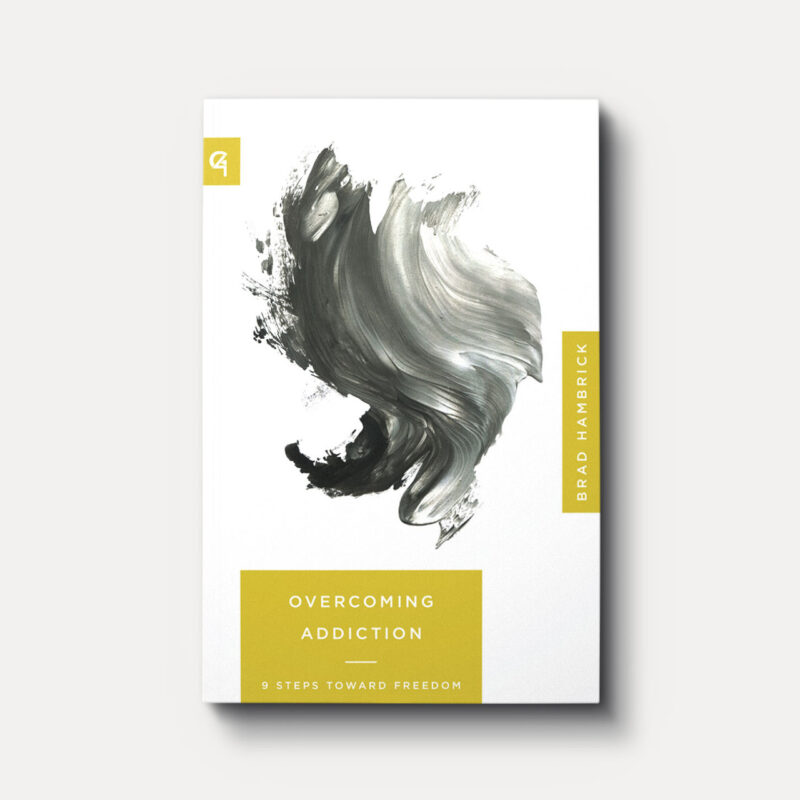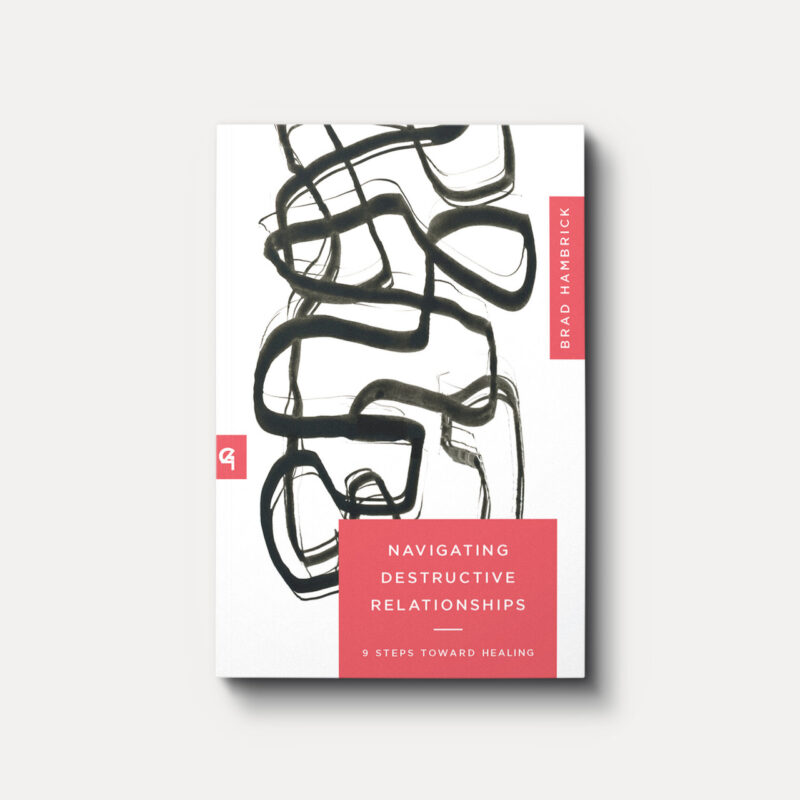Beyond the Book with Dr. Hambrick: “Overcoming Addiction” & “Navigating Destructive Relationships”
Mary Asta Halvorsen | July 29, 2024

Struggles with addiction or the difficulties of navigating a destructive relationship can leave individuals feeling helpless and alone. As part of his series, Church-Based Counseling, Brad Hambrick, assistant professor of biblical counseling at Southeastern, addresses both of these situations in his new books, “Overcoming Addiction” and “Navigating Destructive Relationships.” Written as support group curriculums, these books are great biblically-based resources for churches and individuals navigating the path towards healing.
In the following Q&A, Hambrick takes some time to answer a few questions about these two books.
What is the purpose of “Overcoming Addiction,” and who is its target audience?
“Overcoming Addiction” is written as a group-based counseling curriculum to give churches something they can implement. There are a litany of good books on addiction. I reference many of them in “Overcoming Addiction” and am grateful to stand on the shoulders of their good work. But what I felt like was lacking was a ministry model that allowed churches to utilize lay people to effectively care for those who struggle with addiction and a variety of other life struggles.
“Overcoming Addiction” is for those who struggle with addiction. It is a biblically-based, step-by-step journey from bondage to freedom. “Overcoming Addiction” starts at the beginning of the journey, when someone is resistant to change and defensive toward acknowledging their need to change. It starts by cultivating a commitment to change and then walks with that person toward freedom.
What about “Navigating Destructive Relationships?” What is its purpose, and who is its audience?
“Navigating Destructive Relationships” is also written as a group-based counseling curriculum to give churches something they can implement. Many people want to be helpful for those who are in a relationship marked by addiction or abuse, but they realize that good intentions are not adequate. “Navigating Destructive Relationships” honors the agency of the person in the destructive relationship to make the decisions necessary for their safety while equipping them with biblical principles to think through how to honor their faith in the process.
“Navigating Destructive Relationships” is for those who are in a relationship marked by addiction or abuse. That destructive relationship may be with a spouse, parent, adult child, friend, boss, or co-worker. “Navigating Destructive Relationships” is written for those who value their faith but also recognize that enabling destructive behavior is not God-honoring and that limiting the destruction someone’s choices can create is an act of love, even if that person is upset by our actions.
What is the greatest challenge that people face in navigating destructive relationships?
There are so many challenges when we’re in a destructive relationship. I will discuss one that emerges when we muster the courage to reach out for help. Too often, well-meaning helpers do not understand what it means to honor the agency of the victim. The helper inadvertently starts to fill the role of the destructive person; they start to make choices for them and tell them what they “ought” to do. It takes a skilled helper or informed curriculum to avoid this mistake.
What about in overcoming addiction?
A litany of challenges could be listed. But, perhaps, the greatest challenge is simply being honest about what needs to change. For its inception, addiction feeds off deception and hiding. The person struggling with addiction has spent years, sometimes decades, convincing themself that their struggle isn’t “that bad.” If the whole process of recovery were going to be reduced to one step, that step would be: Be honest with yourself, God, and others. When we refuse to lie and hide, life has the opportunity to improve.
Both of these books are resources in your Church-Based Counseling series. What is this series, and how do these two books fit in the series?
The church has many books on counseling subjects. What is lacking are models that the church can implement. The Church-Based Counseling series is meant to help churches understand the various models of care that can be implemented by lay people. It also helps churches understand the liability concerns that cause many churches to shy away from having a counseling ministry. One of the models the Church-Based Counseling series recommends is group-based counseling. “Overcoming Addiction” and “Navigating Destructive Relationships” are the first two curriculum books to come out in this series.
“Overcoming Addiction” and “Navigating Destructive Relationships” are written around two 9-step models. What is the idea behind this framework?
A plumb line statement for the Church-Based Counseling (CBC) series is: The gospel speaks to both sin and suffering, but it speaks to them differently; offering forgiveness and freedom from sin while offering comfort and meaning amid suffering. This is why the various curriculums in the CBC series are written around two 9-step models: one for sin-based struggles and one for suffering-based struggles.
“Overcoming Addiction” is written around the 9-step model for sin-based struggles. Addiction emerges from our beliefs, values, and choices. We do the things that lead us into addiction. By contrast, “Navigating Destructive Relationships” is written around the 9-step model for suffering-based struggles. We are not responsible for the destructive choices of others in our life, but their choices do impact us in significant ways that we must learn to navigate.
What mindset should readers have when approaching these books?
“Overcoming Addiction” and “Navigating Destructive Relationships” are process books more than education books. They start at the beginning of a difficult journey and incrementally walk with someone through the process of overcoming that challenge. That is what makes them a curriculum for group-based counseling rather than a textbook. If you understand that as you begin it will help you appreciate the pace and style of writing.
How do these two books equip readers to serve the church and fulfill the Great Commission?
“Overcoming Addiction” and “Navigating Destructive Relationships” are meant to be curriculums used within a group-based counseling ministry. At the church where I serve, we call this ministry G4 (www.summitchurch.com/g4). We ask our G4 leaders to view themselves as local missionaries, here to help a specific people group – defined by the topic of their group – find freedom in Christ. It is a beautiful thing to watch as people who know the bondage of a struggle feel commissioned to help others with a similar struggle find the freedom they’ve come to know (2 Cor. 1:3-5).
How have researching and writing these books shaped you spiritually?
“Overcoming Addiction” reminded me of the power and bondage of sin, not just the acts of sin we commit but our sin nature that give struggles like addiction a homefield advantage. Reflecting on the experience of addiction and the journey from addiction to freedom, gave me a fresh appreciation for why sin should not be trifled with.
“Navigating Destructive Relationships” reminded me of the power of relationships and the compassion of God toward us in our suffering. I gained a fresh perspective for why those trapped in a destructive relationship feel painfully alone and crazy. Yet God spoke to these realities, while being both sober and hopeful about the impact that our “as far as it depends on you” choices (Rom. 12:18) can have on these relationships.

"Overcoming Addiction"
Overcoming your addiction is a hard journey, and while nothing makes that easy, it is worth it. Taking this journey one step at a time with the support of others with similar struggles will give much-needed support and help.
If you are willing to admit that alcohol and/or drugs are disrupting your life, “Overcoming Addiction” will guide you toward healing. Counselor Brad Hambrick provides a 9-step framework to help you reclaim your life and experience the freedom God wants for you. Find hope as you learn to be honest with God, yourself, and others.
“Overcoming Addiction” is a support group curriculum that seeks to capture the gospel in slow motion and provide a safe environment for participants to grow together as they pursue steps toward lasting change to addictive patterns.
- 9-step model that gives gospel hope for those whose alcohol and/or drug use has overtaken their life.
- In depth resource for churches and individuals to use for addiction support groups.
- A resource in the Church-Based Counseling series, built on the G4 model of subject-specific, lay-led counseling groups, designed to help churches create sustainable lay counseling ministries.
Paperback, 224
July 29, 2024

"Navigating Destructive Relationships"
When you’re in a destructive relationship, it can be difficult to identify what is happening and how to respond. It is normal to be disoriented by the chaos of a destructive relationship, but you do not have to remain passive in response to your loved one’s destructive patterns.
All relationships disappoint us from time to time. But some relationships are destructive, especially those marked by addiction, abuse, and/or life-dominating problems. “Navigating Destructive Relationships,” a support group curriculum, provides you with a safe and stable place where you can name what’s going on and turn toward God. You are not alone. God sees and cares for your suffering.
“Navigating Destructive Relationships” is built on a 9-step model that helps you process intense relational suffering with the hope of the gospel. Learning alongside others facing similar challenges allows participants a unique opportunity to grow as they identify choices they can make in response to their loved one’s destructive patterns.
- 9-step model that helps participant process intense relational suffering with the hope of the gospel.
- An in-depth resource offers churches and individuals a unique opportunity to respond to destructive relationship patterns in a faith-filled and safe way.
- A resource in the Church-Based Counseling series, built on the G4 model of subject-specific, lay-led counseling groups, designed to help churches create sustainable lay counseling ministries.
Paperback, 224 pages
July 29, 2024